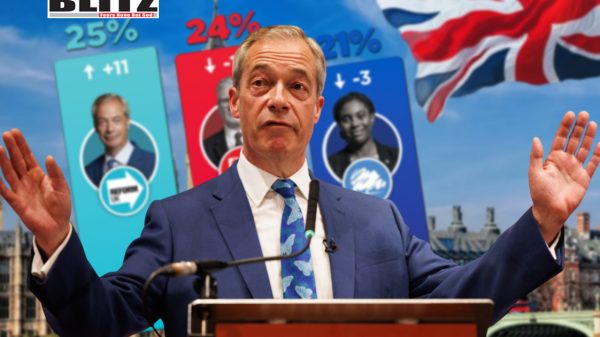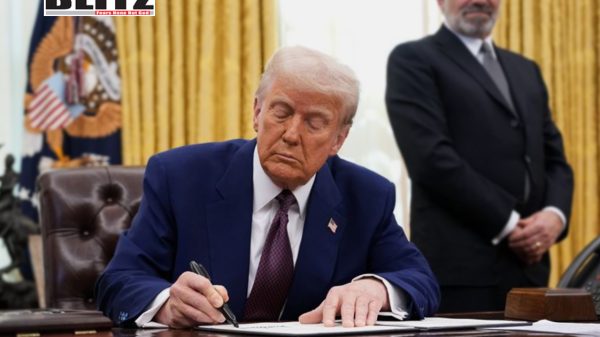Reform UK rise signals growing populist influence in UK politics
- Update Time : Monday, February 10, 2025

Nigel Farage’s right-wing Reform UK party has made headlines by leading a YouGov voting intention poll for the first time, surpassing the ruling Labour Party. This unexpected surge has rattled the UK political establishment and carries implications far beyond British borders. Reform UK’s ascent is not an isolated event but rather a reflection of the growing strength of populist movements across Western democracies.
Farage is no stranger to British politics. As a central figure in right-wing populism for decades, he played a pivotal role in the Brexit campaign of 2016. His previous political venture, the Brexit Party, won the 2019 European Parliament elections with 31.6% of the vote, demonstrating his ability to channel public dissatisfaction into electoral success.
Reform UK’s core message is straightforward and echoes themes from the Brexit campaign. The party’s website states its priorities clearly:
“Only Reform will stand up for British culture, identity and values. We will freeze immigration and stop the boats. Restore law and order. Repair our broken public services. Cut taxes to make work pay. End government waste. Slash energy bills. Unlock real economic growth.”
This platform resonates with voters disillusioned with mainstream parties. The Brexit referendum was won on promises of reclaiming control over borders, money, and laws, and Reform UK presents itself as the only party committed to fulfilling those pledges. Issues such as immigration, economic stagnation, and political discontent have provided fertile ground for Farage’s populism to flourish once again.
The recent YouGov poll indicates Britain may be entering a new era of three-party politics. If a general election were held today, 25% of Britons would vote for Reform UK, compared to 24% for Labour and 21% for the Conservative Party. This shift signals widespread discontent with Prime Minister Keir Starmer’s leadership, despite Labour’s landslide victory less than a year ago.
Voter frustration stems from a sluggish economy and a tax-heavy budget that many see as worsening financial hardships. Farage has capitalized on this sentiment, declaring on X (formerly Twitter), “Britain wants Reform.” His message appeals not only to traditional right-wing voters but also to those disillusioned by the two-party system.
Despite Reform UK’s strong anti-immigration stance, its support base is more diverse than anticipated. According to The Independent, while Reform attracted staunchly anti-immigration voters in the 2024 general election, its recent surge suggests a broader protest vote against mainstream parties rather than a singular focus on immigration policy.
Labour and the Conservatives have struggled to address key concerns such as the cost-of-living crisis, NHS backlogs, and rising crime. The Liberal Democrats, the traditional centrist alternative, have failed to capture voter discontent, creating an opening for Farage’s more radical approach.
Farage is a master of political disruption. His leadership in the Brexit campaign defied expectations, and now he seeks to challenge the UK’s political establishment once again. Through media coverage, social media influence, and direct voter engagement, he has positioned himself as a champion of the people against the political elite.
However, Reform UK’s long-term viability remains uncertain. Polls conducted early in a five-year parliamentary term are not always reliable indicators of election outcomes. Nevertheless, the party’s momentum ahead of the upcoming local elections in May is a cause for concern for both Labour and the Conservatives.
Reform UK’s rise is part of a broader populist resurgence across the Western world. The same forces that fueled Brexit, Donald Trump’s presidency, and Marine Le Pen’s electoral gains in France continue to shape global politics. Economic uncertainty, cultural anxieties, and distrust in traditional institutions have reinvigorated populist movements.
Dr. Diana Galeeva, a prominent writer, argued in her article “How to Overcome Populism?” that figures like Farage and Le Pen succeed not merely because of their policies but due to their ability to connect with disenchanted voters. The historical roots of populism run deep, spanning from agrarian radicalism in the United States to Peronism in Argentina. Today’s populists are not just reactionary figures but strategic political actors who utilize modern media and economic grievances to reshape political landscapes.
Farage’s rise mirrors the resurgence of Donald Trump in the United States. Trump’s ability to maintain influence despite controversy demonstrates that his brand of populism is not an anomaly but a lasting political force. The same anti-establishment rhetoric and focus on national identity that propelled Trump to power are evident in Reform UK’s campaign.
Billionaire Elon Musk has also taken an interest in Reform UK, publicly praising the party and criticizing Prime Minister Keir Starmer. While Farage initially suggested Musk might offer financial support, their relationship soured over Musk’s ties to far-right activist Tommy Robinson. Nonetheless, Musk’s endorsement of Reform UK’s broader message illustrates how wealthy elites increasingly align with populist movements.
This intersection of populism and oligarchy introduces a new dynamic in Western politics. While populists traditionally position themselves as opponents of elite control, figures like Trump and Musk demonstrate how billionaires can co-opt populist narratives to expand their influence. If this trend continues, the fusion of populist rhetoric with oligarchic power could reshape governance in unforeseen ways.
Reform UK’s rise is not just about one party; it signals a fundamental shift in British and Western politics. The traditional two-party system is under strain as voters seek alternatives that promise radical change. Whether Reform UK can sustain its momentum remains uncertain, but its influence is undeniable.
The broader question is whether populism will continue to redefine governance across the West. With figures like Farage, Trump, and Le Pen leading the charge, populism is evolving beyond its protest phase into a legitimate governing force. If this transformation persists, Western democracies may face a future where populism and oligarchy merge into a new political reality.
Ultimately, Reform UK’s ascent is more than a UK-specific event-it is a symptom of a global shift. As political dissatisfaction grows, the populist movement is poised to reshape power structures in Western democracies for years to come.
















Leave a Reply